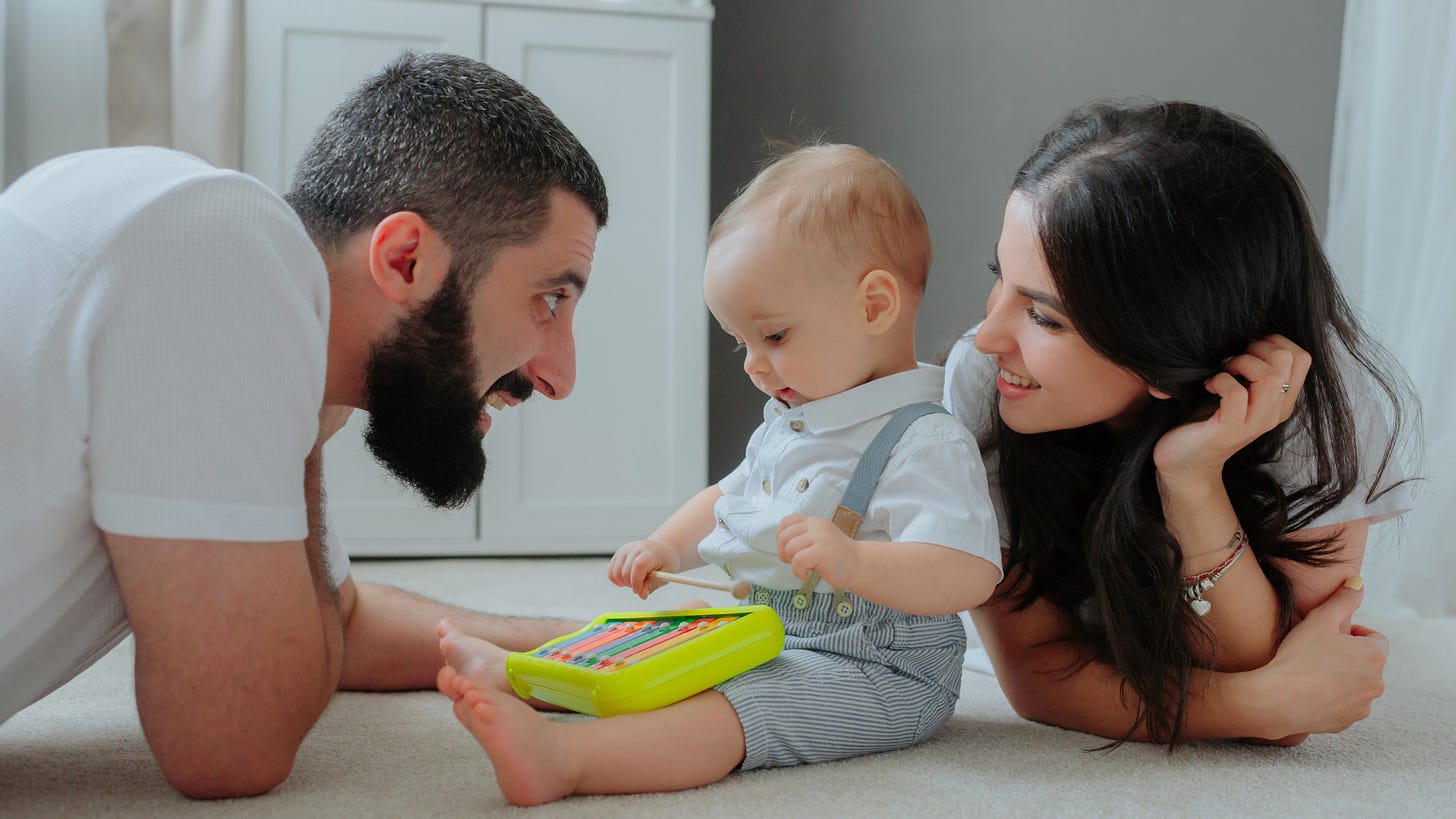Introduction: Father’s Day Special – A Dad’s Perspective
Father’s Day is often marked by ties, cards, and cute crafts but what about genuine conversations? In this special episode of The Modern Indian Parent podcast, host Rinie Gupta sits down with Prranav Vashistha, a father, mental health advocate, and host of the Gut Feel Show to talk about what truly goes on inside the heart and mind of a modern dad. This is not your typical "dad advice" post- it's raw, real, and refreshingly vulnerable.
How Fatherhood Has Changed Over Generations
Fatherhood today looks dramatically different from what it used to be in our parents' generation. According to Prranav, the change has been driven by social shifts- more nuclear families, dual incomes, and a growing cultural emphasis on emotional involvement from both parents.
He reflects on how fathers in the past mainly saw themselves as providers. Their job ended with putting food on the table. Emotional availability, parenting decisions, and day-to-day involvement were considered "not their domain." That mindset, heavily influenced by male ego and societal norms, left many fathers disengaged and, as Prranav suggests, regretful today.
But today, the story is different. Fathers are more present, and more aware. They want to be involved, not just as providers but as equal partners in parenting.
Key takeaways:
Older generations often viewed parenting as a mother’s responsibility.
Male ego and societal influence limited dad’s role.
Today’s fathers are emotionally invested and want equal responsibility.
Why Fear-Based Parenting Doesn’t Work
A powerful part of the conversation is Prranav’s rejection of fear as a parenting tool. He reflects on how children of the 80s and 90s grew up fearing their fathers, not out of respect but because of punishment-driven parenting.
He insists that fear is a dangerous shortcut as it may bring short-term obedience but long-term damage. Instead, Prranav advocates for assertiveness, clear boundaries, and consistency. The idea isn’t to avoid discipline, but to approach it with maturity.
What Prranav advises:
Fear is manipulation and it damages trust.
Assertiveness and boundary-setting are more sustainable tools.
Good cop–bad cop parenting should be shared between both parents.
The Nine-Month Gap: Different Starting Lines for Moms and Dads
One of the most impactful insights Rinie shares is that while mothers often step into parenthood the moment they see the two pink lines, fathers usually arrive at the starting line much later, often only after holding their baby for the first time. This emotional lag, as Prranav describes it, is like a nine-month head start that mothers have over fathers. And it creates an invisible but very real gap in experience, expectations, and emotional readiness.
Prranav points out that during pregnancy, a mother’s entire world shifts as her body changes, her mindset changes, and her priorities reshape around the growing life inside her. Meanwhile, the father, although supportive, isn’t going through the same internal transformation. His reality doesn’t shift until the baby arrives, which often leads to mismatched energies in the postpartum period.
This gap isn’t a problem, he emphasizes- it’s a reality. And the only way to bridge it is with intentional communication. Instead of assuming that dads just “don’t get it,” he encourages couples to use the pregnancy period not just for hospital visits and nursery shopping, but for real, meaningful conversations. What are we feeling? What are we afraid of? How will our roles change? These talks are the scaffolding of a strong co-parenting relationship.
“Those nine months are a chance to talk, not just shop. Use that time to build a bridge.” – Prranav
Should Dads Change Their Lifestyle After Having a Baby?
Yes, says Prranav—loud and clear. The notion that a dad can continue with late-night hangouts, gym sessions, or long office hours while the mom stays stuck in survival mode is not just unfair, it’s harmful.
However, he also encourages moms to acknowledge that dads are nine months behind. He urges mothers to not demand perfection but rather invite participation with patience and warmth.
Things dads should consider:
Scale back on pre-baby routines.
Be present emotionally and physically.
Don’t expect your life to remain unchanged.
Moms: don’t gatekeep, instead bring dads in gently.
How Moms Can Let Dads Help
Despite good intentions, dads often get pushed away subtly or otherwise. Rinie calls this “maternal gatekeeping,” where moms unintentionally restrict the father's involvement by setting unrealistic standards or dismissing their way of doing things.
Prranav explains that perfectionism creates loneliness and discourages fathers from staying involved. Instead, he suggests embracing imperfection and valuing partnership.
Advice for moms:
Stop micromanaging.
Don’t correct every little thing.
Create space for dads to learn, mess up, and grow.
Parenting is teamwork, not a solo act.
What Dads Expect From Moms
It’s not often that we ask dads what they need. In this episode, Prranav articulates it simply: understanding. He clarifies that this isn’t about uninvolved fathers, it’s about those who are trying but often fall short due to their different wiring.
He acknowledges that moms are often multitasking, always five steps ahead, while dads move in a more linear, slower rhythm. The solution, he says, is task division and not competition.
What dads need:
Breathing room to catch up.
Clarity over criticism.
A vertical of responsibilities they can fully own.
Trust that they’ll get there with time.
Dad’s Role in Handling Conflicts with In-Laws
Navigating in-law dynamics is one of the trickiest parts of parenting. Rinie acknowledges that dads are often caught in the crossfire between their mother and their wife.
Prranav’s solution? Diplomacy.
Fathers, he says, must act as bridges and not battlegrounds. Understand both sides, extract the good, and apply it quietly. The goal is harmony, not heroism.
Tips for dads:
Be diplomatic, not confrontational.
Listen to both your wife and mother.
Implement what makes sense without fueling conflict.
Keep the peace without compromising your values.
Setting Boundaries with Extended Family
Prranav believes that true boundaries are set not through conflict but through quiet action. He emphasizes the importance of first forming a united front with your partner. Only then can you gracefully handle extended family pressures.
He reminds us that Indian families thrive on involvement but that involvement needs smart navigation.
His suggestion:
Dad handles his side; mom handles hers.
Stay respectful, but do what works for your nuclear family.
Don’t be rigid or dismissive, be strategic and loving.
Lessons Dads Should Pass On to Sons
When asked what he wants to teach his son, Prranav speaks with conviction. First and foremost—respect. Whether it’s a friend, a parent, a partner, or a stranger, respect should be non-negotiable.
The second is emotional regulation. Through sports, he teaches his son to channel energy and cope with big feelings, laying the foundation for emotional intelligence.
Core values he’s teaching his son:
Respect everyone, at every age.
Understand consequences of your actions.
Learn to channel emotions through positive outlets.
Closing Thoughts: Fathers Will Feel Seen & Heard
This episode isn’t about idealizing dads, it’s about understanding them. As Prranav rightly says, dads don’t lack the will; they just need time and space to match the pace. It’s a powerful reminder that parenting isn’t about roles, it’s about relationship.
And if you’re a dad reading this, know this: you are seen, and your role matters more than ever.





